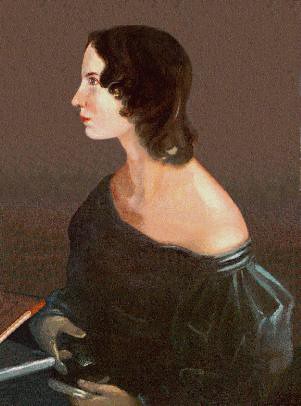
source.
Emily Bronte was born on July 30th 1818 at Thornton, Bradford in Yorkshire, the fifth child of the six children.
Her most celebrated and indeed only novel, Wuthering Heights was published in 1847 under the pseudonym Ellis Bell.
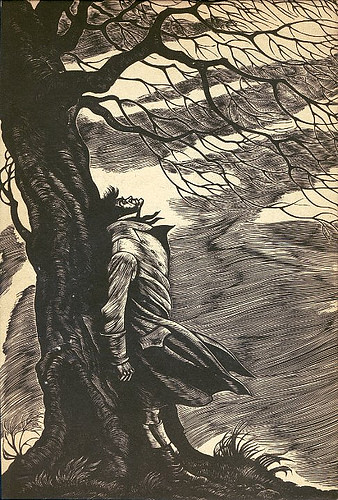
Illustration by Fritz Eichenberg for 1943 Random House edition.
For a clergyman's daughter, Emily harboured some curious views about life and death, and indeed the afterlife. The gothic workings of her mind are spilled out on the pages of Wuthering Heights. Her father, Patrick, encouraged his children's independent learning and even indulged Emily's refusal to attend Sunday services. Charlotte described her sister as 'a solitude-loving raven, no gentle dove'.
Wuthering Heights is a profound work of the imagination, brimming with 'wickedness' and 'villany'. Emily (although assumed to be a male) was described as an author 'who goes at once fearlessly into the moors and desolate places'. One critic advised that the book be burned.
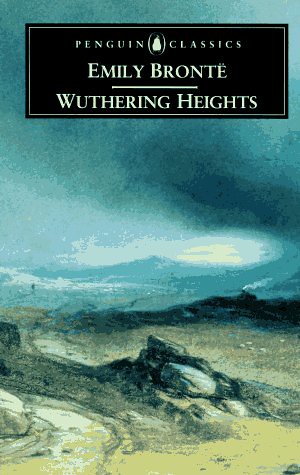
Emily was most at home on the wild moors, much like a heroine from her own work. Her intense love for the Yorkshire landscape that surrounded her is reflected in Wuthering Heights. The sharp northern air, the springiness of the heather and the gloom of the desolate moors are all set out in such lush and graphic detail. Words were Emily's oils and the paper upon which she wrote her canvas. The gothic eeriness of Emily's descriptions of interiors and landscapes in Wuthering Heights conjure up associations with Plath's psychic landscapes. Emily was influenced by the metaphysical works of Lord Byron and Walter Scott, her own childhood experiences at boarding school, the death of her mother and siblings. The macabre and unnatural excited her ghoulish imagination.
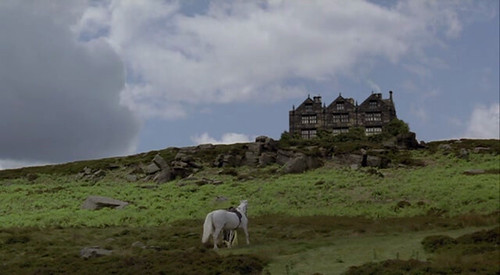
Still of the Wuthering Heights from 2009's Wuthering Heights adaption.
For you see, Wuthering Heights is no mere romance gone sour, it's the story of more than one woman's life, the characters are tangled in an emotional and ultimately destructive web their author has created for them and for herself. It poses moral questions; questions the existence of God and an afterlife, it struggles to find the boundaries between obsession and love, ideals of masculinity and femininity are Emily's dark creativity is all encompassing, perhaps exacerbated by her own seclusion from the world outside her own immediate physical and emotional world.
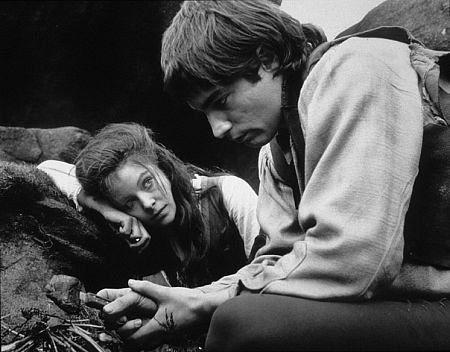
Wuthering Heights, 1970.
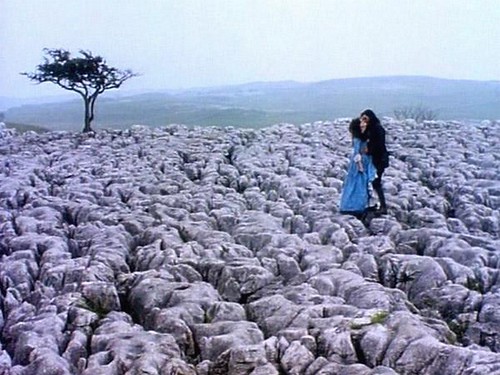
Wuthering Heights, 1992.
source.
The lives of the Bronte's was an ill-fated one, two sisters died in their childhood (1825) and the only brother Branwell's dependence on drink and opium heightened his sense of self pity and worthlessness. Emily passed away in December 1848, aged thirty years old. Branwell had died three months beforehand of consumption, at thirty-one. Anne died the next year, aged twenty-nine and Charlotte followed her sisters six years later in March 1855. Patrick Bronte outlived all his children, he died at Haworth in 1861, aged eighty-four.
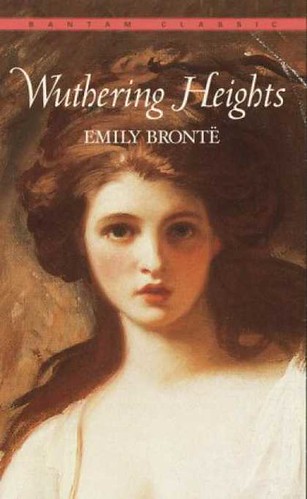
I've found people either love it or hate it, and isn't it great that Emily was able to rouse such opposing emotions in her readers?! Of course I'm the former! This book is a rebel yell against the feminine constraints of Victorian society. Sexual frustration, violence, resentment, human frailty, suffering and mortality all come into cruel play in this ultimate gothic 'romance'. (If you like your romance ultimately destructive and leaving you feel distressed that is). I like to feel that Emily built a little of herself into Heathcliff, it was how she could masquerade in male form and give the (intellectual) finger to the patriarchy by making him as brutal as possible.
"I'm wearying to escape into that glorious world, and to be always there; not seeing it dimly through tears, and yearning for it through the walls of an aching heart; but really with it, and in it." (Wuthering Heights, 1847, Emily Bronte).
Further reading:
BrontëBlog
Bronte Sisters, Haworth
Emily Bronte, Poet of Solitude
Wuthering Heights community
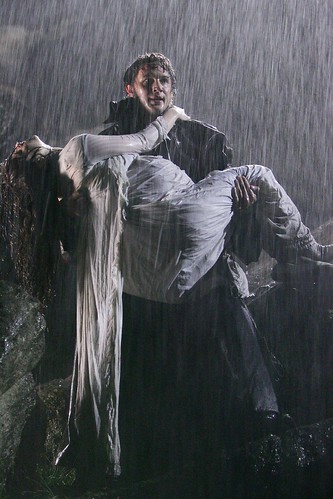
Wuthering Heights, 2009.
Film/tv adaptions:
Wuthering Heights, 1939
Abismos de pasión, 1954
Wuthering Heights, 1970
Wuthering Heights (TV), 1978
Hurlevent, 1985
Emily Bronte's Wuthering Heights, 1992
Wuthering Heights (TV), 1998
Sparkhouse (TV), 2002
Cime tempestose (TV), 2004
Wuthering Heights (TV), 2009
Wuthering Heights, 2011
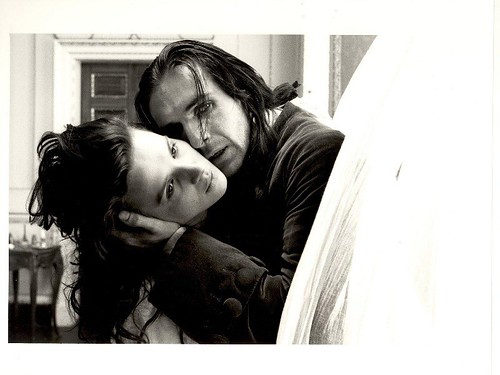
Wuthering Heights, 1992.
source.
I wrote this to celebrate my heroine Emily Bronte, on International Women's Day 2011.

Great post!
ReplyDeleteI love Wuthering Heights.
Super lovely blog!
ReplyDeletexoxo,
colormenana.blogspot.com
Yorkshire representing! :D
ReplyDeleteShe is pretty awesome though. I shall have to watch the adaptation since I have no money to buy the book!
Probably a little unrelated but "Wuthering Heights" came on shuffle a while ago. Kate Bush is A-maah-zing.
ReplyDeleteZoe I still need to read Wuthering Heights.
ReplyDeleteWhat a shocking confession!
But also I now have a blog, hurray!
My updates will be very random & not very often I fear... but at least I can have a list of lovely people such as yourself to follow :) x
I just discovered your wonderful blog through 'The Bronte Sisters' blog...and actually, I just finished reading Wuthering Heights this past week, and afterwards, I watched a marathon of three of the movies...2009 being my favorite. They all take a bit of leeway with the story, but the acting was superb in this version...especially 'Heathcliff'!
ReplyDeleteI felt as if I was in a thunderstorm the whole time while reading WH, and although I absolutely loved it, I was quite relieved when it was finished...I seemed to have picked up a bit of crank and moodiness while reading it, which I'm sure would have pleased Emily very much, but I was happy to have them gone, and have some sunshine return to my countenance! It is brilliant though...I need to read it again with a notebook and pen in hand.
Wonderful and timely post...
xo Jessica
Hi Jessica! I'm only coming by this comment now! Thank you for taking the time to share with me your impressions of reading WH! My much loved and dog eared copy of WH is one of the cheap Wordsworth Classics editions so I have attacked it enthusiastically with a pen!
DeleteOut of interest, how did you find me via the Bronte Sisters blog? That's one of my favourites, so maybe it was via a comment I made? Thanks so much.
xo Z